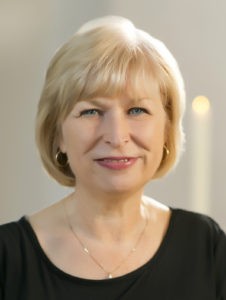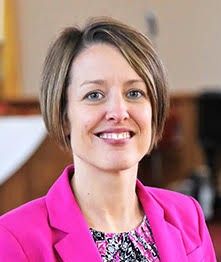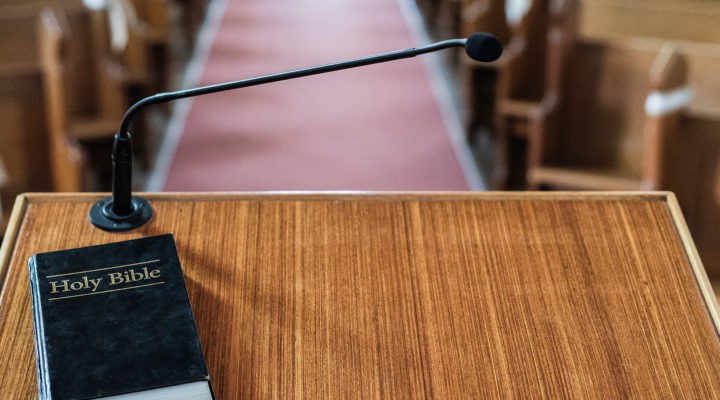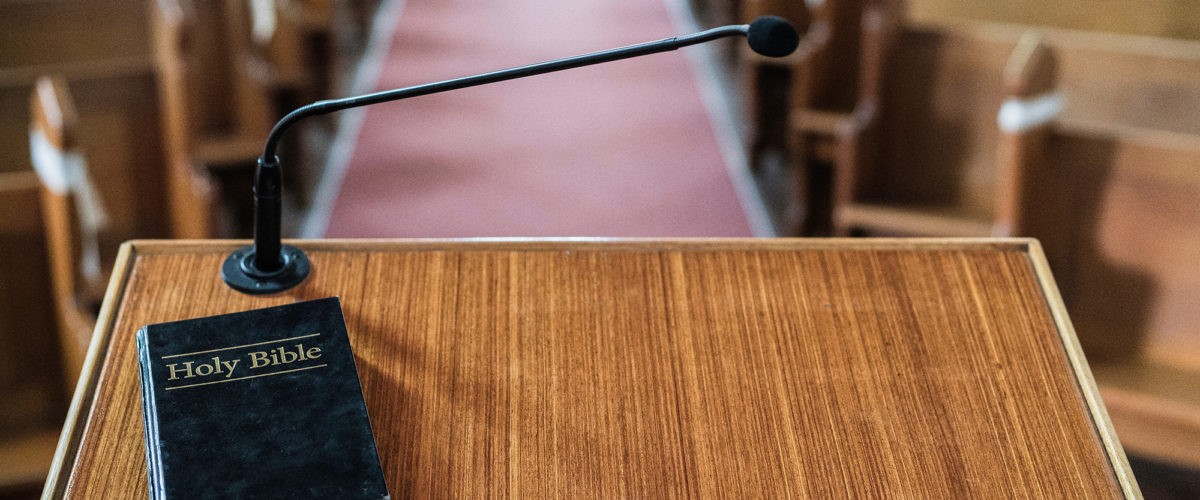The recent surge of COVID cases led one of my (Carol) pastoral colleagues to lament, “It feels like we are living a terrible version of the film Ground Hog Day.” In Columbia, Mo., where I live, we have more COVID cases now than at any time during the pandemic. Because the Omicron variant appears to be milder than other strains, many churches are continuing in-person worship services and events. Yet, the surge is still disrupting congregational life.
This week at my (Carol’s) church, we saw an uptick in online participation and a decline in in-person attendance; we canceled an upcoming event that included a meal. Before worship on Sunday, we had to scramble to find a Scripture reader because the person slated to read was waiting for the results of a COVID test. My 7-year-old daughter woke up with some congestion Sunday morning and thus watched Disney Plus in my office instead of attending Sunday school.

Pam Durso

Carol McEntyre
I was not alone. This past week I have had multiple conversations with pastoral colleagues who are also pondering “if” their congregations should return to online worship until this surge passes. We all want to make wise decisions and keep our congregations healthy and safe.
For me (Pam), Omicron resulted in another cancellation of travel plans. I was hoping so hard to be present at my friend Gary Burton’s 50th anniversary celebration as pastor of Pintlala Baptist Church in Pintlala, Ala. Yet the number of COVID cases in Alabama is staggering, and airline travel these days is both risky and unpredictable.
My Sunday morning was instead spent at a worship service here in the Kansas City area where I heard a comforting but also challenging sermon on Matthew 11:28: “Come to me, all you who are weary and burdened, and I will give you rest.” Near the end of his sermon, the pastor quietly said, “I am tired, just so tired.”
Near the end of his sermon, the pastor quietly said, “I am tired, just so tired.”
This exhausting roller coaster ride of COVID continues for us all as we enter the third year of the pandemic. It has interrupted and re-interrupted congregational life and left Baptist churches wondering if their sense of community can or will ever be restored. It also has left us with fewer Baptist pastors.
About the survey
In the fall of 2021, we became alarmed by the rising number of pastoral resignations. Our concern for pastors and their congregations led us to conduct a survey by which we invited Baptist pastors who had left their congregations between July 1, 2020, and Oct. 17, 2021, to participate. For the survey, our definition of “pastor” included those serving in senior, associate, youth, children, music, college and other staff positions in congregational settings. In the 17 days that the survey was open, 100 pastors responded. Our survey is a snapshot of a brief period in Baptist life, a time influenced by extraordinary societal circumstances and significant challenges to the church.
We discovered that COVID was a contributing factor in the resignation decision of the great majority of our survey participants. Of the survey participants who commented on COVID’s impact on their leaving their churches, 9% responded that the pandemic had no impact and 11% indicated that the pandemic had a little impact. But 24% noted that COVID was a contributing factor and 56% believed it played a significant role in their decision.
“We discovered that COVID was a contributing factor in the resignation decision of the great majority of our survey participants.”
Many participating pastors pointed to work overload caused by new ministry demands, which in turn resulted in exhaustion and ultimately resulted in resignation. One pastor wrote, “The additional duties of becoming a technical wizard was exhausting.” Another shared, “Our online service was robust and well done. I was doing most of the editing, but I was working 55 to 60 hours a week, and that quickly became unsustainable.”
Several pastors commented that their departure resulted from their congregation’s lack of support during COVID, including one who wrote: “I live with a chronic illness and repeatedly asked church leadership for a mask requirement, contact tracing and a written church plan/policy. It took eight months and a COVID-exposure event within our congregation for sufficient protocols to be put into place. During those months, I repeatedly asked for help and did not feel heard or cared for.”
Amplified challenges
Numerous pastors stated that the pandemic served to amplify challenges already present within the congregation and magnified previous conflicts. One wrote, “COVID-19 intensified anxiety levels and intensified dysfunctional dynamics already at work within the congregation.” Another commented, “It amplified everything that was honestly already there to unbearable decibels.” Still another noted, “I have no doubt the underlying contentious decisions of COVID added to the overall divisive nature of my congregation.”
The increasing societal inability to have civil conversations and come together across disagreements was evident in many congregations. One pastor wrote, “What I discovered when we reopened our building was that everyone was less cooperative, more angry than normal, and not sure they wanted to stay in relationship. I observed both social and mental fractures. We lost our civil discourse. No matter what I said, recommended, wrote in a newsletter, preached in a sermon, or voiced in a prayer, a highly vocal percentage of my congregation told me I was wrong.”
“No matter what I said, recommended, wrote in a newsletter, preached in a sermon, or voiced in a prayer, a highly vocal percentage of my congregation told me I was wrong.”
Unquestioned loyalty and long-time obligations to church life also were tested during the pandemic. One pastor commented, “COVID-19 presented the opportunity for many church members to leave. These were individuals who may have varying levels of dissatisfaction prior to COVID, but the extended closure of church buildings and lack of interpersonal dynamics (fellowship/koinonia), gave them the perfect opportunity to slip away and try something new, or to drop out of church entirely.”
Perhaps the most common theme in the comments of pastors who responded to our survey was that COVID served as a catalyst in their own journey of spiritual and vocational discernment. Some wrote that they finally had the time and space to reimagine life beyond vocational ministry. For others, the fragility of life highlighted by the pandemic pushed them to rethink their priorities and purpose.
The words of these pastors are very telling:
- The pandemic gave me more time to SLOW DOWN and think, listen, discern and follow God’s call away from that congregation and toward a new vision.
- For the first time in 20 years of vocational ministry, I had the chance to slow down at times and finally asked myself: Can I really do this work for another 20 years? I didn’t work less during COVID — quite the contrary. However, working from home in isolation made me (or perhaps presented an opportunity to) weigh my loyalty to the church. I decided my sanity, my family, my marriage and my kids were more important.
- The pandemic gave me a sense of clarity in what was important to me, and what I discovered is that most important was my mental health and my family’s well-being.
- COVID was the catalyst that pushed me over the edge to make changes in my life. I think it did that for a lot of people as we realized life is short and fragile.
- I felt like I was wasting so much time navigating people’s feelings about our COVID protocols that I could not lead them in ministry any longer. I felt like I was not being faithful to my call by allowing myself to be daily consumed by church members who believed I was failing them and the church. I felt like the most faithful and obedient step was to leave and try to get healthy.
Our data reveal that COVID was a contributing factor to the resignation for most pastors who participated in our survey. Yet many of them indicated they were experiencing stress, heavy workloads, and were burned out prior to the pandemic. When COVID hit, they were pushed to the breaking point and felt resignation was necessary for their mental health and well-being.
COVID, year three
As we enter the third year of the pandemic, COVID cases are surging again across the country. Pastors are once again pushed into decision-making about moving worship fully back online or adding restrictive measures for in-person participation. Congregations are again discussing the cancelation of activities.
“We are concerned there may well be another wave of resignations this spring.”
Given the Baptist resignations of 2020 and 2021 and the current COVID situation, we are concerned there may well be another wave of resignations this spring. Most pastors are exhausted and stressed, and with this new rise in cases, they are now barely holding on.
We have no easy answers, but our concern about feelings of isolation and burnout among our pastor friends has increased in the last few weeks. In our culture, with its bootstrap mythology and can-do spirit, admitting we are not doing well is hard. It takes courage for a pastor to be vulnerable and say, “I am burned out. I need help.” It also takes courage for a church member to ask, “How are you doing? What do you need?” and then be willing to hear and believe their pastor’s response.
It takes courage for congregations to create a plan that allows for rest and healing for pastors. Sadly, we have heard stories from pastoral colleagues who have reached out to their personnel committee for help and have been patronized or shamed for admitting they were struggling. But there are other stories from colleagues who asked for help and have received compassionate care from their congregations.
We have learned from this survey work that COVID contributed to the recent departure of a good number of Baptist pastors, and we know that successfully navigating this new variant will require pastoral courage and congregational courage. Prioritizing the health and well-being of our pastors will be critical for churches in this third year of the pandemic.
Pam Durso serves as president of Central Seminary. Carol McEntyre serves as pastor of First Baptist Church in Columbia, Mo., and is immediate past moderator of the Cooperative Baptist Fellowship.
Related articles:
Leaving church: So many Baptist resignations | Opinion by Pam Durso and Carol McEntyre
Pastoral friendships have been a sustaining grace the past two years
Too many pastors are falling on their own swords | Opinion by Jakob Topper


